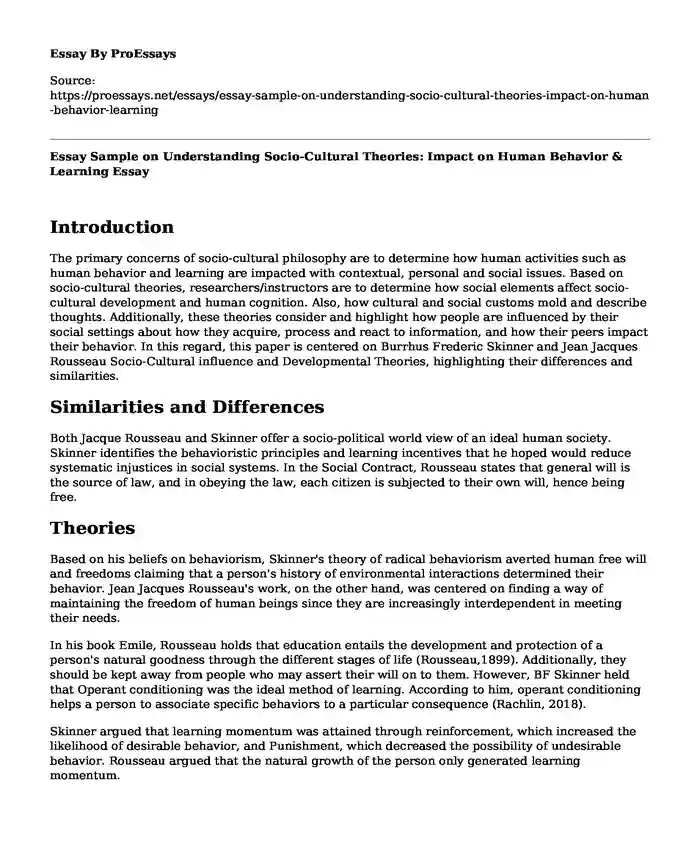Introduction
The primary concerns of socio-cultural philosophy are to determine how human activities such as human behavior and learning are impacted with contextual, personal and social issues. Based on socio-cultural theories, researchers/instructors are to determine how social elements affect socio-cultural development and human cognition. Also, how cultural and social customs mold and describe thoughts. Additionally, these theories consider and highlight how people are influenced by their social settings about how they acquire, process and react to information, and how their peers impact their behavior. In this regard, this paper is centered on Burrhus Frederic Skinner and Jean Jacques Rousseau Socio-Cultural influence and Developmental Theories, highlighting their differences and similarities.
Similarities and Differences
Both Jacque Rousseau and Skinner offer a socio-political world view of an ideal human society. Skinner identifies the behavioristic principles and learning incentives that he hoped would reduce systematic injustices in social systems. In the Social Contract, Rousseau states that general will is the source of law, and in obeying the law, each citizen is subjected to their own will, hence being free.
Theories
Based on his beliefs on behaviorism, Skinner's theory of radical behaviorism averted human free will and freedoms claiming that a person's history of environmental interactions determined their behavior. Jean Jacques Rousseau's work, on the other hand, was centered on finding a way of maintaining the freedom of human beings since they are increasingly interdependent in meeting their needs.
In his book Emile, Rousseau holds that education entails the development and protection of a person's natural goodness through the different stages of life (Rousseau,1899). Additionally, they should be kept away from people who may assert their will on to them. However, BF Skinner held that Operant conditioning was the ideal method of learning. According to him, operant conditioning helps a person to associate specific behaviors to a particular consequence (Rachlin, 2018).
Skinner argued that learning momentum was attained through reinforcement, which increased the likelihood of desirable behavior, and Punishment, which decreased the possibility of undesirable behavior. Rousseau argued that the natural growth of the person only generated learning momentum.
Conclusion
Arguably, the application of educational theories has surpassed disciplinary bound due to its relevance in almost all fields of study and practice. Consequently, apart from behaviorism, which is centered on the measurable and observable facet of human behavior, other theories can be adopted for different objectives. These include; social cognitive theory, which focuses on an individual's lesson from their interaction and observation of other people. The socio-cultural theory proposes that people's behavior and thoughts vary from culture to culture and are progressively changed due to social interaction—the experimental learning theory, where lessons are generated through behavior, cognition, experience, and perception.
References
Rachlin, H. (2018). SKINNER (1938) AND SKINNER (1945). Behavior & Philosophy, 46.
https://behavior.org/wp-content/uploads/2019/04/BPv46-6-RACHLIN.pdf
Rousseau, J. J. (1899). Émile, or treatise on education (Vol. 20). Appleton.
https://books.google.co.ke/books?hl=en&lr=&id=BgoBAAAAYAAJ&oi=fnd&pg=PR7&dq=Jean+Jacques+rousseau+education&ots=D3gWfAewTn&sig=UD_appmXVNXM5jdCZJJYqgeykPA&redir_esc=y#v=onepage&q=Jean%20Jacques%20rousseau%20education&f=false
Cite this page
Essay Sample on Understanding Socio-Cultural Theories: Impact on Human Behavior & Learning. (2023, Oct 17). Retrieved from https://proessays.net/essays/essay-sample-on-understanding-socio-cultural-theories-impact-on-human-behavior-learning
If you are the original author of this essay and no longer wish to have it published on the ProEssays website, please click below to request its removal:
- Critical Essay on American Dream in The Great Gatsby
- Essay on Comparing and Contrasting Two Siblings
- Ethics: The Five Basic Principles Essay Example
- Essay Example on Lesbian Rights and BDSM: Establishing Mental Condition for Justice
- Paper Example on Triage Officers' Ethical Obligations for Efficient Patient Sorting
- Essay Example on American Music: A Reflection of Cultural Diversity & Global Influence
- Essay Example on Psychological Disorders: A Gradual Process of Change and Effects







